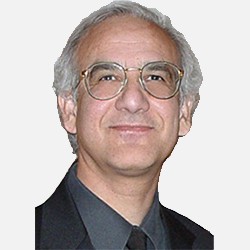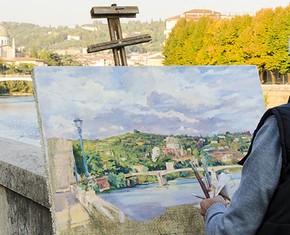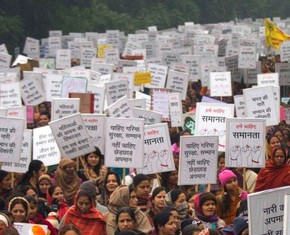The views expressed in our content reflect individual perspectives and do not represent the authoritative views of the Baha'i Faith.
In his book The Secret of Divine Civilization, Abdu’l-Baha depicted the model of social development of the West as one-sided and inadequate.
As we’ve seen in this series of essays, Abdu’l-Baha supported and encouraged the adoption of the positive elements of the Western model—primarily the learning and implementation of modern science and technology, and moving towards a universalistic and democratic pattern of authority in which any form of discrimination on the basis of religious belief, sex, class, race, ethnicity, political beliefs and other personal characteristics are excluded. In the Baha’i teachings, this process of democratization and inclusion is indeed a moral imperative and a universal aspect of definition of development for any society in the modern age.
However, contrary to Iranian secular intellectuals who advocated blind imitation of the West, Abdu’l-Baha criticized fundamental aspects of the Western model of social development.
For Abdu’l-Baha, true modernity is not yet realized in the West, not only because of the persistence of varieties of discrimination and prejudice—an issue emphasized by Abdu’l-Baha constantly in his trip to Europe and America—but also because the Western concept of rationalization is only an instrumental one. True rationalization requires both spiritual and material progress, the Baha’i teachings say. Iranians, therefore, should follow the scientific and technical achievements of the West, without following its one-dimensional approach to modernity and development.
Abdu’l-Baha’s criticism of the objectivistic model of the Enlightenment can be summarized in three arguments:
- The Enlightenment offered a static view of human nature—and society.
- Also, the Enlightenment presumed an atheistic view of reality.
- Finally, Western culture, despite its progress, still evinces militarism, colonialism, domination, and international aggression.
First, he argued, Enlightenment theory is based upon a static conception of human nature and society. For Abdu’l-Baha, humans are both spiritual and historical beings, and society is an organic, ever-evolving entity. Modernity, in other words, is a historically-specific phenomenon. However, he said, the present structural characteristics of the world require a new approach to the concept of development. Development has to be understood both in terms of universal and global common principles and as a decentralized local process.
Abdu’l-Baha’s second argument against the philosophy of the Enlightenment is related to its atheistic aspects. He directly mentions Voltaire and criticizes his assumption that instrumental reason without the support of spiritual values is sufficient for a progressive social order. Abdu’l-Baha’s discussion here is similar to Baha’u’llah’s pronouncements on the question of order:
Religion is verily the chief instrument for the establishment of order in the world and of tranquillity amongst its peoples. – Baha’u’llah, Tablets of Baha’u’llah, pp. 63-64.
For Abdu’l-Baha, social development not only requires scientific and material creativity and progress, but also spiritual renewal and progress.
The Baha’i teachings maintain that the philosophers of the Enlightenment made a basic mistake by equating traditional religious customs with the indwelling spirit of religion. They called for scientific and institutional change, but failed to see the need for spiritual regeneration as well. Instead, they rejected religion and spirituality altogether. Baha’is believe that effective order depends on internal restraints, universal love and solidarity, and practical rationality:
It is certain that the greatest of instrumentalities for achieving the advancement and the glory of man, the supreme for the enlightenment and the redemption of the world, is love and fellowship and unity among all the members of the human race. Nothing can be effected in the world, not even conceivably, without unity and agreement, and the perfect means for engendering fellowship and unity is true religion. – Abdu’l-Baha, The Secret of Divine Civilization, p. 73.
In The Secret, Abdu’l-Baha pointed out that the present customs among the believers of different religions should not be equated with the truth of religion. In his historical analysis, he showed the creative role of divine revelation in the creation of civilization, the extension of unity and fellowship, and the advancement of science and civilization. Essentially, the Baha’i teachings say neither rejection of religion nor blind obedience to the past traditions is the right choice. What is required is the adoption of a progressive and historical approach to divine revelation.
More specifically, Abdu’l-Baha argued that contrary to the idea of the philosophy of the Enlightenment, morality requires a spiritual commitment. Concerning the argument that people are instinctively equipped with moral consideration and therefore need no spiritual guidance and education, he replied that man’s so-called “moral sense” is in fact a product of education. He also noted that even if there is an inherent moral sense, it would be confined to just a few individuals, and not represent a feature common to the masses of people. But even a latent moral sense, Abdu’l-Baha wrote, needs actualization through religion and spiritual education. Furthermore, he made it clear that moral principles are historically inspired by great historical religions. Finally, he added that even if a person is morally inclined, his purity of heart and good intentions will increase through spiritual feelings.
Abdu’l-Baha’s third objection against the Western model of development concerned itself with Western culture and its policies of militarism, colonialism, domination, and international aggression:
The people of Europe have not advanced to the higher planes of moral civilization, as their opinions and behaviors clearly demonstrate. Notice for example how the supreme desire of European governments and people today is to conquer and crush one another. – Ibid., p. 61.
This question is central for Abdu’l-Baha’s worldview, given his belief in the oneness of humankind and his commitment to the principles of love, unity, and peace. In fact, his affirmation of the need for a global approach to development is influenced by his rejection of the culture of violence and aggression. Authentic modernity and development, Abdu’l-Baha wrote, is defined by higher levels of capacity for love, unity and service. That is far from the militaristic, selfish, and materialistic culture of the West and its theoretical expression.
You May Also Like
Comments

















It would be interesting to ...analyze the bits of theses genuine progresses around the world, in relationship with the writings.